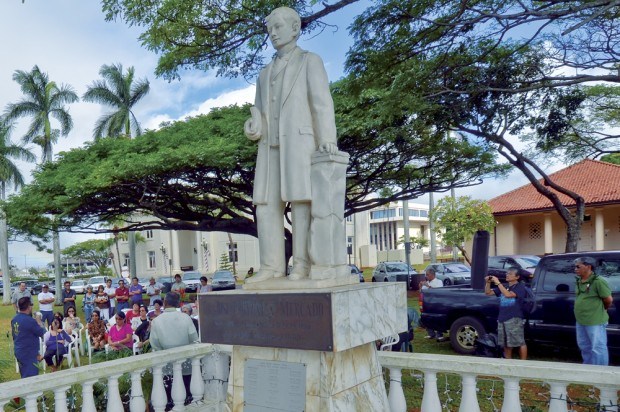LIHU‘E — Representatives of numerous Filipino community groups met with Kaua‘i Filipino Community Council members Saturday to honor the memory of Jose Rizal, considered a Filipino national hero. Standing at a statue of Rizal on the lawn of the Historic
LIHU‘E — Representatives of numerous Filipino community groups met with Kaua‘i Filipino Community Council members Saturday to honor the memory of Jose Rizal, considered a Filipino national hero.
Standing at a statue of Rizal on the lawn of the Historic County Building, Ramon Dela Pena, a member of the University of Hawai‘i board of regents, asked where Filipino residents of Kaua‘i would be without Rizal’s accomplishments. The silent response was his answer.
The groups meet each year on or near the date of his execution in 1896 to remember Rizal.
“As we commemorate the death of Jose Rizal, help us to be inspired and motivated by his ideals, dreams and works which, in part, are reflected in an invocation for motivation quoted by Mahatma Gandhi, that it is the action, not the fruit of the action, which is important,” Belma Baris, who recently retired from the county’s finance department, said during an opening invocation.
“May we leave this place today motivated to right another wrong in our world, no matter how large or small that action may be,” Baris said.
Dana Padua, a nursing student at the University of Hawai‘i at Manoa, said that growing up in the Philippines, she only knew Rizal as a name on a statue.
Asked to deliver an address Saturday, Padua said she discovered Rizal was multi-talented, attending universities in different parts of the world to earn a doctoral degree in philosophy. Padua said she also learned he was an inventor, scientist, ophthalmologist, painter, artist and multi-linguist.
These traits are the reason the Kaua‘i Filipino Community Council continues to host the annual ceremony, council president Jimmy Iloreta said. He encouraged young people to learn more about Rizal as they continue their education.
Padua said she found similarities between Rizal’s life and hers.
“For one, I was by force, or maybe by choice, migrated to another country just like Rizal,” she said.
Padua said many Filipinos left the Philippines not only to secure a better economic life and more education, but also to breathe more easily in a political atmosphere which has more freedom, and more tolerance and respect for human rights.
“Rizal, who migrated to seek better opportunities, brought along his unwavering love for the Philippines, his passion for life and his thirst for excellence,” the Kaua‘i High School graduate said.
“We, the youth, the promise of tomorrow, should heed his call and follow in his footsteps. He has become an inspiration for me to stand up for what is right and to fight for what we believe in,” Padua said.
Queenie Daligdig, helping husband Teddy finish his saga of a trip to the Philippines, said visiting the Philippines makes people in America appreciate all they have.
Teddy Daligdig is a second-generation Filipino worker brought to Hawai‘i to work on the plantations. He visited the Philippines last year in search of his genealogical roots.
Rizal was born on June 19, 1861, and died before a Spanish firing squad on Dec. 30, 1896, during the Philippine Revolution (1896-1898). His martyrdom inspired fighters to continue until the Philippine archipelago was able to defeat the Spanish army.
• Dennis Fujimoto, photographer and staff writer, can be reached at 245-3681 (ext. 253) or dfujimoto@ thegardenisland.com.


